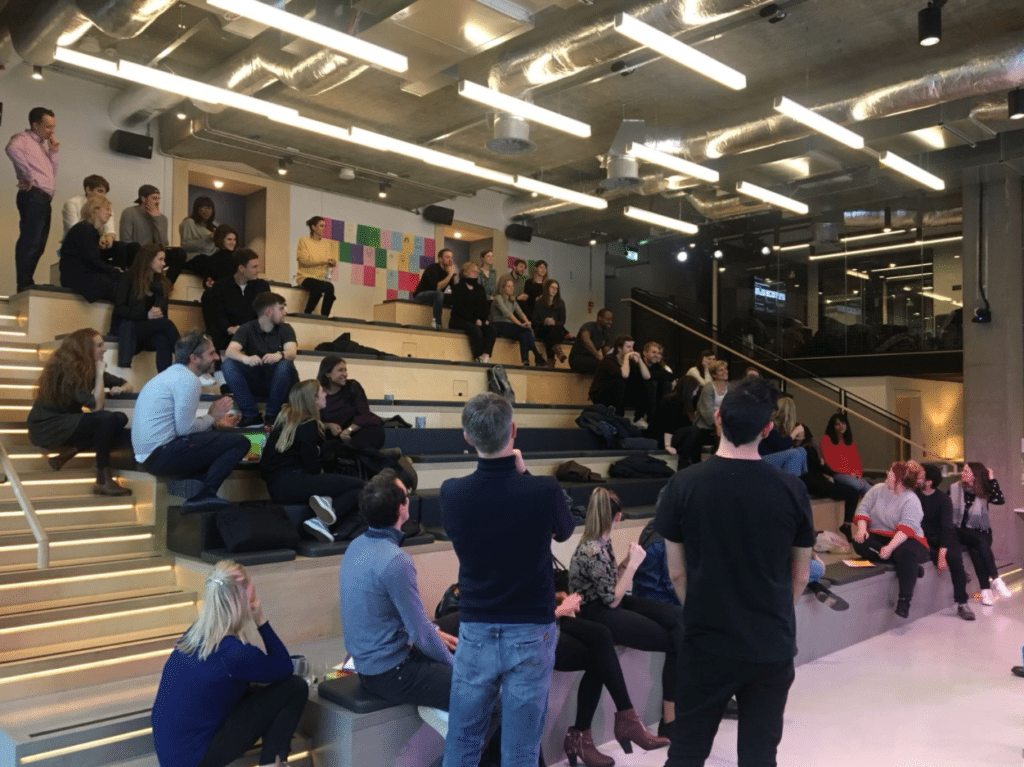At Tech City UK’s quarterly strategy workshop earlier this month, we were privileged to have Wendy Tan White MBE – entrepreneur, investor and a member of our Board – come to discuss some of the key challenges related to the rollercoaster that is scaling a digital business.
Tan White is a British tech entrepreneur and investor with a formidable record. As co-founder and CEO of Moonfruit, she scaled her business, twice, before it was acquired by Yell Group in 2012. She then became Partner at Entrepreneur First, a mentor at 500 Startups and most recently joined BGF Ventures in June 2017 . Since 2015, Tan White has been on the board of Tech City UK.
After a day of team building and company value exercises for our team, Tan White dropped in on us at RocketSpace, to answer our questions about her experiences in tech and her advice to founders.
Tan White explained that it was by assessing what mattered most to her, that lead her to a life of entrepreneurship. After studying Computer Science at Imperial College, Tan White trained as an accountant at Arthur Andersen, the former Big Five accountancy firm. She soon grew tired of the cookie-cutter culture and processes – and being in an environment that valued brand association, accolades and salary above anything else. She realised that what she valued most was autonomy and the ability to make an impact through her work. It was these values that provided the basis for her entrepreneurial mindset, and later success. As an investor, Tan White says she now asks the tougher questions surrounding the impacts of tech companies and their culture as a result.
Scaling, twice
Tan White set up the DIY website builder Moonfruit in 2000 during the dotcom boom. Like most successful entrepreneurs, she saw an opportunity that wasn’t being met by existing products – before the emergence of blogging sites, Moonfruit allowed for a simple click and drag website build, democratising internet publishing.
When the dotcom bubble burst, investment dried up and Moonfruit went from a 60 person company to a business of just two. Tan White admitted that letting people go – some of whom were friends and family – was a massive learning curve. After riding the investment train for years, they had to bootstrap, scale organically, and dramatically change their ways of working.
Tan White believes that a brand has to have consistency to work, and to scale, and that this contributed to Moonfruit’s survival. She has always seen great value and importance in creating a work culture which puts integrity at the forefront and reflects the values of the business. She sees this as a key driver to company success.
Tan White says “the best people to work with anticipate what will happen, and take the initiative.” Part of this can be achieved through hiring, and part through culture.
Tan White admits that her favourite stage of Moonfruit was when there were around 40 people, both times around. During the second time, they were able to have a different kind of appreciation and excitement around customer traction.
Exiting & Failure
Moonfruit was finally rebuilt, and acquired by Yell Group for £23 million in 2012. Tan White explained that when you’re acquired, there’s suddenly a different level of resources, and that allows for a level of scaling and growth previously unattainable.
She told us that exiting is always a balance of market forces, and a difficult decision to make. Sectors have different value cycles, and you have to judge the right time to leave.
Tan White made the point that exiting founders, or even founders of companies that fail, put value back into the domestic tech ecosystem. They start new companies, become investors or engage in mentorship. The money doesn’t simply evaporate when it’s invested in companies, it reemerges in new startup births, and enriched talent recycled in the ecosystem.
Motivation
It’s important to make sure you’re working for the right reasons. Success as an output doesn’t satisfy Tan White. Instead, original thinking as a driving force is much more satisfying, and often leads to success as a byproduct. She also makes it clear that the team dynamic in a business is especially important; if your employees aren’t emotionally invested in what they’re working for, they won’t do a good job towards achieving it.
Tech for good and tech for bad
It can be a lonely business being an entrepreneur, and it’s vital to maintain physical and emotional wellbeing. Tan White admits that the entrepreneurial mentality is addictive; you’re often running on adrenaline and in need of your next hit. But that’s also not necessarily the most healthy way to live. Her best piece of advice for founders is to defend your work-life balance like your life depends on it, “because it does”.
These days it’s easy for everybody to be constantly switched on through our smartphones. She says that even if we don’t believe we’re addicted to social media, we probably are. Whether it’s through exercise or mindfulness, it’s important to keep mind and body healthy; “we’re a combined machine”.
She also advises enforced breaks from technology from time to time, perhaps a “Sunday Sabbath”, if you can manage it.
As well as wanting a break away from technology from time to time, Tan White says she is also stricter now when it comes to difficult founders. She says while others might be willing to work with people with a bad attitude, she isn’t, and certainly doesn’t feel obliged to. She won’t invest in somebody she can’t work with. It’s a personal choice but it’s one that Tan White, and increasing numbers of investors takes seriously.
The UK as a global tech hub
We asked how Tan White felt that the UK faired compared the the rest of the world on tech excellence. She felt that the UK is seen as a potential leader in artificial intelligence globally. People are starting to recognise the talent that the UK has, and we’re getting better at bringing capital to great research. And for fintech startups, last year London gathered more investment than any other city in the world.
Fifteen years ago, Moonfruit had to look to Paris and Silicon Valley to find funding, but due to a combination of UK investors, and active inward investment, UK startups don’t need to do that anymore. It’s an exciting time for UK tech.
Culture is important in communities as it is in companies. Different tech clusters and sectors all over the UK behave differently and grow at their own rate. Different places across the country have their own culture, and that’s important to maintain, it provides a USP. UK tech clusters shouldn’t be competing with each other, but working to be the best they can be, and work to their particular strengths.
Wendy Tan White’s recommended reading:
Legacy by James Kerr
Originals: How Non-Conformists Move the World by Adam Grant
Mindset: The New Psychology of Success by Carol S. Dweck


